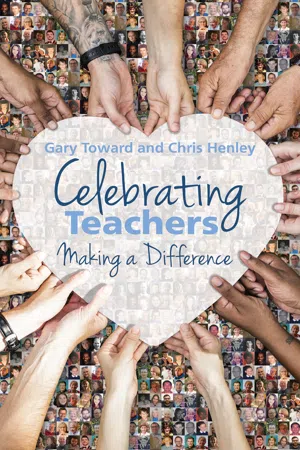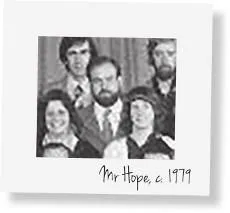It must have been like Groundhog Day for the young Nigel Boyd. His dad was in the RAF and his school life until the age of 13 was one of both constant change and repetition. By the time he’d settled into what was to be his final school, he’d already been to five others as his family followed his dad as he travelled the globe to different RAF stations. This was 1976 and schools were very different in those days. Lessons were very dependent on what the teacher liked teaching and any schemes of work would be largely unrecognisable compared to what teachers of today are used to. There was no national curriculum and schools therefore had carte blanche to teach pretty much what they liked and in whatever order suited them until pupils picked options for their exams and syllabuses kicked in. This meant that Nigel often found himself repeating things he’d already been taught and there’s nothing much more demotivating than having to do the same thing over and over again. We can just imagine his face on hearing his teacher excitedly inform the class that they were going to start a new topic on the Romans when he’d already done it twice before. Differentiation hadn’t made it into the educational lexicon either, so there was no chance of a teacher doing something completely different for Nigel. If that wasn’t bad enough, the opposite could also happen. He’d miss vital topics and would suddenly be bewildered by a new topic as it relied on another one having been studied. He was demotivated, bored and going nowhere.
Nigel freely admits that because of this he became the class clown and was certainly underachieving. Mr Hope changed this – and what a perfect name. He became the first teacher in Nigel’s school life to spot what was happening to Nigel and set about making him feel differently about school.
We wouldn’t be surprised if you were thinking that Mr Hope was a young and trendy teacher who glowed coolness. Not at all! Nigel describes him as being incredibly ordinary, middle-aged, unfashionable, always seeming to wear the same sports jacket and trousers. There was nothing young or trendy about him at all, but he was popular with pupils all the same. His lessons, unlike many Nigel remembers, were 16always calm. This was the time of corporal punishment (which was officially banned in 1986 in state schools in England and, shockingly, in 1999 in public schools) and teachers could always resort to physical punishment if they needed to keep discipline. But not in Mr Hope’s lessons; they ran smoothly, not because he was a disciplinarian, but because he made them so interesting. Nigel cannot recall him ever raising his voice.
Interesting lessons were just the start. Mr Hope performed that magic trick of making his subject important and made sure that the way in which he taught his topics gave his pupils an understanding of why they were so important. He put the topics in context so the class always understood the point and how the concept might be useful to them in the outside world – and that’s not always easy if the subject you are teaching is mathematics!
But it was another thing that really made a difference for Nigel: how Mr Hope made him feel. As Nigel puts it, he made him feel good. This is because of the focused way in which Mr Hope used praise and rewards, ensuring that when Nigel put his hand up and made a valuable contribution to a class discussion or when he’d worked hard and solved a mathematical problem, for example, he was praised. The result of this was that Nigel evolved from the pupil who was attending school but pretty much going through the motions to one who wanted to do more and developed a desire to do well.
The whole class benefitted from this approach. One of Nigel’s favourite rewards was on offer at the end of term. Quite clearly Mr Hope was tuned in to the kid culture of the time. Monty Python, the Goodies and Spike Milligan were generating all manner of surreal and often irreverent humour. Tapping into this rich seam, Mr Hope would reward the group for their hard work. Nigel particularly remembers how he would read extracts from Spike Milligan books, which the group all loved and found hilarious. He was particularly adept at impersonating the crow’s voice from the slapstick classic novel Pukoon, which, possibly because it was a little on the rude side, had the whole class in stitches.
Gradually, due to being immersed in this incredibly positive classroom culture, Nigel transformed from being a pretty average mathematician to one of the highest achieving in the class.
‘I remember being really proud when Mr Hope suggested that I, along with a small number of other pupils in the class, took further maths, as well as our normal O level. I went on to have Mr Hope for A level and continued to enjoy his lessons, achieving my highest A level grade in his subject.’
Nigel is very clear about the impact Mr Hope had on his life and explains that without his teaching, he would not have had such a successful and enjoyable career.
‘He certainly made me realise I had more potential – and his excellent teaching ensured I got top grades in maths O and A levels.’
Nigel was lucky enough to have other inspirational teachers in PE. Being very sporty he loved the subject, played football, rugby and cricket for the school and got to county level in athletics – all due to the teaching and nurturing of his PE teachers, who he says often went well beyond the call of duty, personally driving him to athletics events. They and Mr Hope inspired him to want to become a teacher. Initially, because it was his first love, Nigel wanted to be a PE teacher but later decided on maths instead. He did a maths-related degree at university, followed by a maths PGCE. Without Mr Hope awakening the mathematician in him, he says that he does not think that would have happened.
18Nigel began teaching in 1984 at the age of 22. Such was the impact of Mr Hope’s teaching style and influence on him he often modelled his teaching style on the methods that had changed his own life so much.
As we have already mentioned, when we present to trainee teachers and NQTs we often ask why they have chosen this career path. Over and over again (and there are more stories later in this book) we find that teachers so often inspire others to become teachers, just as happened to both Gary and Chris. The legacy that this creates is huge as the inspirational brilliance of one teacher like Mr Hope then gets transferred to countless others.
In Nigel’s case, it had extra power. Having risen through the teaching ranks to head of department, then deputy head, he became a head teacher at the age of just 35. Over the next 15 years he was the head of three different schools. He also had spells as a local authority advisor and Ofsted inspector (including being seconded as an HMI for a year). Now a self-employed school improvement consultant, he looks back and wishes he could thank Mr Hope for the inspiration he was to him and wishes that he had taken the opportunity to thank him back then. But the power of Mr Hope’s legacy does not stop there. It has continued into another generation. One of Nigel’s children – partly inspired by Nigel’s love of teaching – is now a head of history, teaching in a secondary school. All this stems from Mr Hope having inspired the young Nigel, helping him develop a thirst for learning and therefore forge a new path in life that would lead to more and more children being inspired. Mr Hope’s legacy lives on today.
The difference?
We couldn’t have picked a better teacher to start with, not just because Mr Hope has a great name for a teacher, but because he resonates with everything we believe a great teacher should be, with a pedagogical approach that we guess inspired hundreds more kids. Here are the insights that every teacher can take away from John Hope’s incredible approach.
Nigel makes it very clear that not every lesson he went to was calm and full of well-behaved kids like the ones in Mr Hope’s classroom. In fact, he also points out that he was fond of a bit of larking about himself and would have continued doing just that if something hadn’t caused a change to occur in him. In our careers, we have never met a pupil who has skipped back into a classroom the next day having had a detention for misbehaviour the day before. Back in the late 1970s, we guess that Nigel would not have suddenly become motivated to work harder at his maths if Mr Hope had wielded the slipper or screamed and shouted at him. The first question every teacher must answe...










